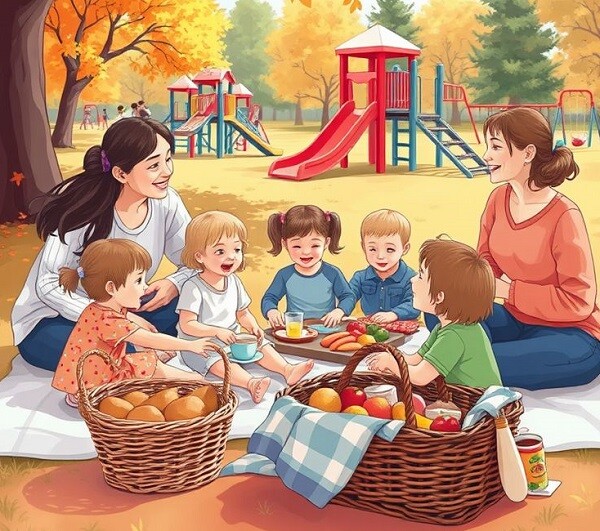The incident left Xiao He’s parents confused and wondering why their daughter was depressed. They were well-off, with a four-digit allowance readily available in the drawer. They never refused if their daughter wanted something, and all their earnings went to her. It seemed like a happy life.
Xiao He’s parents didn’t understand what she was thinking. They were very busy with work and often left home early and returned late. Every day, when Xiao He came home from school, the house was empty. When she did well in school, she wanted to share her joy, but her parents were always in a hurry and didn’t have time to listen.

Illustration photo.
On one occasion, the school organized an event and requested that parents attend, but Xiao He’s parents were unable to make it. Seeing the other children interacting closely with their parents made Xiao He feel a great sense of loss.
She felt like a tiny object forgotten in a corner. Gradually, she became silent and lost her enthusiasm for both studies and life.
The purpose of making money is to provide a better life for the children. However, Xiao He’s parents were too focused on their work and neglected their daughter’s emotional needs. As a result, Xiao He did not feel their care and love, gradually becoming very negative in both her psychology and behavior, with no sense of happiness.
In fact, parenting is not just about providing money; it’s about making sure your children feel your love. Experts have listed ten crucial moments when children feel deeply loved. If parents can accomplish three or more of these, it proves they are very successful in raising their children and instilling love.


Do parents give their children a warm greeting when they wake up in the morning?
Say “good morning” to your child in a gentle tone and with a warm smile, so they can feel positive emotions and your love from the start of the day.
When you greet your child with a warm tone, they feel your attention and care. A smile is an expression of happiness and a wonderful way to convey love. These little moments help children feel safe and loved, building self-confidence in their young hearts.

Say “good morning” with a gentle voice and a warm smile.

Do parents encourage their children before they go to school?
When children are getting ready for school, parents can say encouraging words like, “I wish you good luck today” and “Mom and Dad believe you will have a wonderful day,” to boost their self-confidence.
This trust from parents acts like a protective armor, helping children overcome any worries and pressures they may face during the school day. These words of encouragement create a positive mindset, preparing children to face new challenges.

Does the family often eat together?
If possible, parents should try to be home for dinner with their children. Mealtime conversations are also a great way for parents and children to interact.
At the dinner table, parents and children can share their daily experiences. Children can talk about interesting things that happened at school, such as games they played with friends or funny incidents in the classroom. Parents can share small details from their workplace to increase mutual understanding and affection.
When the family gathers to eat, the warm atmosphere strengthens family bonds, and children feel this connection.

The family often eats together.

When children face difficulties in their studies, do parents patiently guide them?
When children encounter academic challenges, do parents respond with patience or anxiety and blame? If parents scold their children at this point, it will only increase their stress and discouragement. Therefore, it’s essential to create a relaxed environment. You might hug your child and say, “It’s okay; this question is a little tricky,” to help them psychologically.
Then, parents should patiently analyze the reasons for their child’s academic difficulties. If they haven’t mastered the knowledge, review the textbook with them. If their learning method isn’t suitable, discuss more effective approaches and encourage them to try different problem-solving techniques or new learning strategies.

Parents patiently guiding their children through academic difficulties.

Do parents make thoughtful preparations for their children’s birthdays?
Birthdays often become the happiest moments and most beautiful memories for children. Parents should carefully prepare for the birthday party and invite their child’s good friends to attend.
If the family can afford it, decorating a room with balloons and streamers and providing a delicious birthday cake will bring joy and surprise to the child. Receiving a long-desired gift on their birthday is also a source of happiness.
Whether it’s a beautiful doll, a fun toy car, or a meaningful book, these gifts carry the love of parents, and children will remember the beauty of their birthday every time they see or use them.

Do parents and children spend quality time together on weekends?
Weekend time for parents and children is precious. Parents can take their children to the park for a walk, enjoying nature’s beauty, or visit a museum to gain knowledge and new experiences. Alternatively, they can do crafts and play together at home to strengthen emotional bonds.
Taking a relaxing vacation with your child is also an excellent way to unwind and rejuvenate both body and mind.

Parents and children spending quality time together on weekends.

Do parents often say, “I love you” to their children?
In Vietnamese culture, parents may be reserved in expressing their love, but saying, “I love you,” is essential for children. This phrase gives children a strong sense of security.
It helps them build self-confidence, face life’s challenges positively, and develop mental and emotional resilience.
In daily life, fathers can say, “I love you,” at any time or express their love through warm hugs.

Do parents comfort their children when they have interpersonal problems?
If your child has a conflict with a classmate and comes home in tears, first, give them a hug to comfort them, and then listen carefully to their complaints.
Next, offer reasonable suggestions and teach them how to behave in relationships. This also demonstrates your love, showing your child that you are their strongest support.

Parents should first hug and comfort their children when they have conflicts with friends.

Do parents praise their children when they achieve good results?
It is very meaningful for parents to praise their children when they achieve good results. This praise boosts self-confidence and a sense of accomplishment and motivates children to continue striving in their studies.
Parents should use specific words to commend their children’s efforts and progress, such as, “You’ve made great progress in this exam, and I know you’ve been studying hard every day. Well done.”
Alternatively, you can reward them with small prizes, such as a long-awaited book or the opportunity to go out and play.

It is very meaningful for parents to praise their children for their good results.

Do parents accept their children unconditionally, even when they are in a bad mood?
It’s essential for parents to accept their children’s negative emotions. This acceptance helps children feel understood, trust their parents more, and be willing to confide in them.
Acceptance doesn’t mean indulgence; it means recognizing the validity of your child’s emotions. For example, if your child is sad about losing their favorite toy, you might say, “I know you loved that toy, so it’s understandable that you’re sad about losing it,” and then guide them in processing their emotions healthily.
The companionship of parents with their children is a crucial emotional bond. Through shared experiences, this bond deepens, and children feel their parents’ love and care.
Daily interactions like cooking together, watching movies, going for walks, and playing games help children feel their parents’ love and attention. Children build trust and dependence on their parents through this emotional connection





































